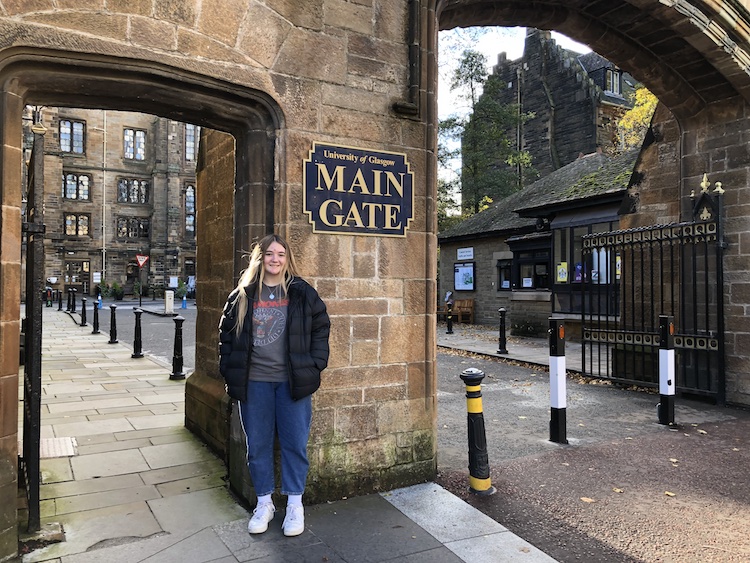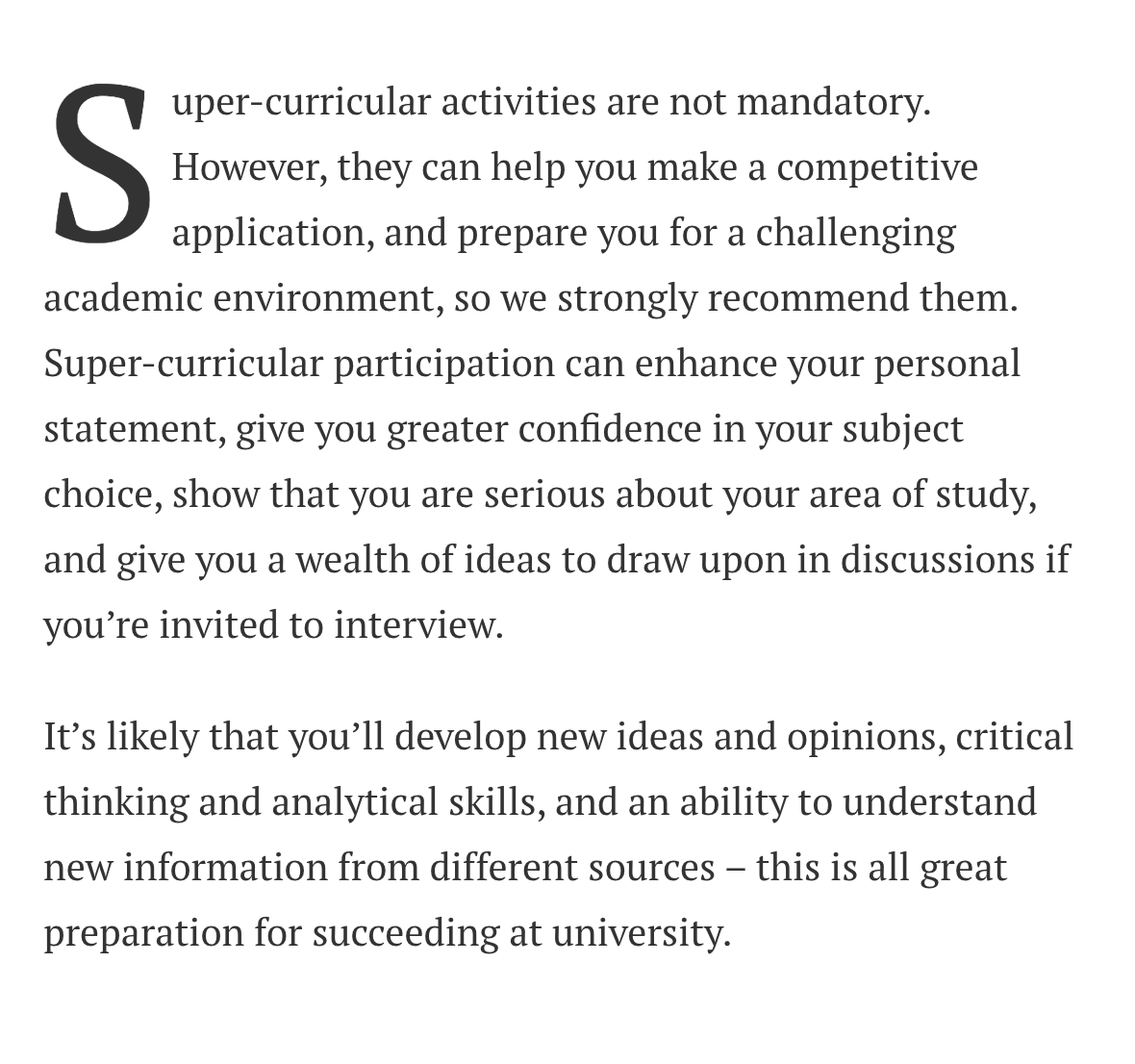
Today I’m sharing my template and top tips for a UCAS personal statement.
If you have kids coming into Year 12, you’ll be amazed how quickly teachers encourage students to start thinking about their personal statements. At Flea’s school, it was a regular topic of conversation from the January of Year 12 (or lower sixth). But it’s not always easy to know how to make a personal statement stand out.
If you’re sitting and staring at a blank form right now, I’m here to help! Read on for my personal statement template and top tips for your UCAS application.
When to start your personal statement
Students need to start considering what they will put on their UCAS personal statements in Year 12, or lower sixth form. That’s because this is the year you have time to do extra things that you can put on your statement. It’s not so easy in Year 13.
If you can, I’d suggest thinking about doing stuff for your personal statement in Year 11 and Year 12 especially if you’re applying for a very competitive course or university.
When to write your personal statement? Well, it depends. If you’re applying for medicine/veterinary science/dentistry or Oxbridge, you’ll need to submit your UCAS application in mid-October. If you’re applying for most courses, though, you need to submit your application in January of Year 13. I’d advise starting to plan out your statement anywhere from June up to September.
My daughter got lots of advice from admissions officers and teachers. Over the summer she also did practice interviews and admissions workshops at Exeter and Oxford universities while attending summer schools. As a Mum I also attended several webinars with admissions tutors offering parents advice, run by Cambridge and Lancaster Universities. We’ve listened to lots of advice, basically.
UCAS Personal Statement Structure:
It’s easy to over-think the structure of your personal statement. But it’s not that deep. I promise.
Personal statements should generally follow what’s called the “three paragraph rule”. The three paragraphs to include in a good personal statement are:
- Why do I want to take this subject and this course?
- What academic and super-curricular activities show I’m suited to this course?
- What can I share about my future plans and my extra-curriculars?
Paragraph 1: Why this subject/course?
The first part of the personal statement template is self-explanatory. Why do you want to study Maths at Exeter or Nursing at Edge Hill or Astrophysics at Cardiff?
Paragraph 2: Why am I suited to this course?
So you’ve established why you want to study a subject, but will you be any good? Now, you need to convince the admissions staff that you have the enthusiasm and skills to excel at your chosen course. You do this by talking about things you’ve done in school and how you have built on that learning outside of school.
Paragraph 3: Future Plans and outside interests
Lastly (and most briefly) your third paragraph should mention your plans, along with any relevant hobbies and interests.
UCAS Personal Statement Structure:
What’s going to make your statement stand out is how you use these three paragraphs to show your aptitude, your enthusiasm and how your skills make you likely to succeed on this course. If you do that, your personal statement will stand out.
Below is a simple template of how to construct a personal statement if you’re finding it tough to get started.
This template is based on multiple conversations and webinars with university admissions tutors in the last two years. It might not be totally applicable to you, but it should be a useful guideline when it comes to what to include and what to skip. Read on to find tips on personal statements generally.

UCAS Personal Statement Example:
Paragraph 1: Over-arching introductory statement:
As mentioned we’re kicking off by explaining why this subject and this course.
Maybe don’t say, “Ever since I was young, I’ve been fascinated by…” This is boring and it’s a cliche. We’re going to be better than that.
Try and think of a statement or story that explains how you feel about this subject. One student I know opened with, “Economics is a religion,” while another explained how visiting a specific set of caves sparked an interest in the subject she was applying for. Aim for something more like, “Since visiting the Whatever Exhibition at the Ashmolean, I’ve realised that history is a lens through which we understand how societies function,” or even, “Given the challenges that our planet faces, I can think of no better subject to study than X.”
Paragraph 2: Academic/Extended study:
Next, we move onto the part of the personal statement template where you show that you’re not just keen to study politics, you’re going to EXCEL at studying politics. And you do that by showing all the ways you’ve demonstrated how well suited and how committed you are to learning about politics (or another subject).
Remember, universities like A-Levels. But they love when you extend that learning outside of school, because you are so passionate about your subject.
Anything you do outside of school that extends your understanding is called a super-curricular. In this template, super-curriculars are very important. That’s because they’re helping your personal statement stand out. Here’s what one university website posted this year:
 So a typical personal statement might say, “As part of my A-Level in philosophy, I’ve enjoyed creating a mixed media project about how Plato’s philosophy is informed by the teaching of Aristotle.”
So a typical personal statement might say, “As part of my A-Level in philosophy, I’ve enjoyed creating a mixed media project about how Plato’s philosophy is informed by the teaching of Aristotle.”
But a GREAT personal statement could follow up with, “This inspired me to subscribe to Philosophy Now magazine, where I was fascinated by the series of articles written by [clever person] about the philosophy of education.”
Super curricular activities are really important but they can be anything. Of course you can attend courses and lectures and summer schools, but equally you might subscribe to a magazine, listen to a podcast, watch TED talks or do work experience. Here are some examples of great super-curriculars.
Do you have opinions?
When talking about your academic learning, whether it’s in school or outside, talk about what you learned.
Don’t just write that you read a book. Tell the admissions tutor what you thought of it. Did you agree, disagree, or deepen your understanding of an issue? You could say something like, “When reading [clever book] I found the author’s arguments about the absence of women from modern philosophy unconvincing, considering the evidence to be found in the work of [second clever book] or “I found listening to this podcast series really helpful in considering the impact of political change on communities, and I was able to apply this to my A-level coursework in sociology.”
And repeat:
Try to use multiple examples of this sort of learning and how you engaged with your subject. For each new activity you mention, remember to say what you learned and if you agreed/disagreed or were inspired to study something new.
Paragraph 3: Hobbies and Extra-Curriculars
The third part of the UCAS personal statement template is optional.
If you have space, you can mention relevant extra-curricular activities such as sports, hobbies and associations. This isn’t critical, particularly for academic focused subjects. As one admissions tutor said to my daughter, “If you’re applying to Oxford to study history, I don’t give a **** if you were on the cricket team.”
University admissions care most about your learning and your interest in your subject. Without exception, every university professional I’ve spoken to has said you should only give the briefest mention to extra-curricular activities in your personal statement. It’s really enough to include one sentence that says, “In my spare time, I enjoy competing in national karate tournaments and have a part-time job in a local DIY store.”
The only reason to mention an activity at length is if the skills you developed through that activity are directly relevant to your proposed degree.
For example, did climbing help you understand geology? Did volunteering in a children’s hospital help you build skills you’ll need for a nursing degree? You might say something like, “In my spare time, I am in a local theatre group and have taken on several supporting roles. This has given me a great insight into how historical drama can be thrilling to a modern audience.”
Paragraph 3 (alternate) Future Plans:
If you don’t have relevant hobbies, then my template moves on to future plans. This is your chance to talk about your reason to study. So if you can, briefly mention, “I’d love to study this subject at university to support a future career in…” or ” After this course, I would like to study for a Masters in…”
Top Tips for a UCAS Personal Statement
Now you have a template for a UCAS personal statement, here are some more general tips about your application:
Start to plan in Year 12
A good tactic is to have a spreadsheet or list. Every time you take part in an activity, watch a lecture or read a great book, make a note of what you read. Also make brief notes on something you agreed with, something you learned, and something you didn’t agree with. These notes will form the basis of a great personal statement in Year 13, when you can cherry pick your best insights and experiences.
Make a point of reading successful examples of personal statements
There are websites where you can find examples of statements that were written by people applying to your course and perhaps even your chosen university. This will give you a good idea of what your competition might look like, and can be applied to your template.
This isn’t your parents’ personal statement
It used to be about showing you were good at school and a rounded person. That just isn’t the case any more. It’s more like a job application where you’re demonstrating your skills and knowledge. So ignore your parents and follow the personal statement template.
You don’t need to spend a fortune
Fancy trips to Namibia to save an endangered animal aren’t a requirement. It’s perfectly okay to read Nature magazine instead.
Short of things to mention in your personal statement?
If you want to include out of school activities on a personal statement, include things that show you’ve learned or developed a skill that is directly applicable to your chosen course. For example. “Working part-time in a cafe helped me to gain an understanding of how seasonal businesses maximise revenue in a shorter trading period” or “Taking part in the DofE allowed me to see the landscape of the Yorkshire Moors up close, and i was able to see the impact of climate changes on water levels in the streams below Random Town.”
Avoid exaggeration and cliche
When it comes to cliches, everyone has had a passion for their subject since they were young, and everyone built teamwork and communication skills by playing football, or whatever sport. Don’t go down this road, and certainly don’t mention anything that isn’t true and you can’t back up if you get asked about it.
Don’t focus too much on school activities
Being in the debate society or law society is a great thing, as is winning an academic prize or joining a great school trip. But your teachers will mention these things in your academic reference. Given you have finite space in your UCAS application, don’t waste it talking about things that will be included elsewhere on your form.
Get lots of feedback
Ask teachers for opinions on your personal statement. They’ll know what works and can give you feedback and advice on early drafts. Ask more than one teacher to get a more rounded view of your statement, and ideally ask at least one teacher who did the subject you’re applying to study!
Be genuine and enthusiastic
If you want to know how to make your personal statement stand out, be yourself. People who follow model statements all read the same books and listen to the same podcasts. You can stand out by finding that niche that really interests you. Besides, you could write a perfect statement that makes you sound like a completely different person and end up on a course that doesn’t suit you at all.
Proof, proof and proof again
And when you’ve done that – proof it again. Have someone else proof your statement. Don’t just proof the statement, check that you’ve completed all the boxes and the course numbers are correct. I can neither confirm nor deny rumours that I know a teenager who applied for the wrong college at one university, and the wrong course at another. Luckily a teacher picked it up, but it’s as well to print things out, wait a day, then check them thoroughly.
Related Reading
If you have teens in Year 12 who are considering applying to university next year, you might find these posts helpful:





